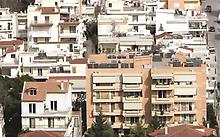Last Friday’s meeting between Environment, Energy & Climate Change Minister Yiannis Maniatis and Germany’s Vice Chancellor Sigmar Gabriel, the Minister of Economic Affairs and Energy, has renewed interest in a relatively recent study on energy-efficiency upgrading for buildings in Greece.
The two officials discussed the creation of a new fund for energy-related upgrades to buildings to be financed by the German investment bank KfW.
A study conducted between 2009 and 2010 by the Center for Renewable Energy Sources and Saving (CRES) – known locally as KAPE – estimated that 120,000 new jobs and investments worth 120 billion euros, over a 15-year period, could be generated by an energy-efficiency upgrade program for buildings in Greece, both domestic and commercial.
The proposal, tabled by Gabriel, would add to the involvement of KfW in the effort being made to revive the Greek economy. The German bank has already provided 100 million euros, for financial support to small and medium-sized enterprises, to one of three sub-funds that make up the Greek Investment Fund (IFG).
On a wider level, recent studies showed that energy-efficiency upgrading work on buildings could generate over two million jobs throughout Europe until 2020. Greece would benefit greatly as it is estimated that 89 percent of buildings in the country were constructed prior to 1980. It is estimated that some 3.7 million buildings in Greece have not been upgraded for increased energy efficiency.
The program being discussed, to offer low-interest loans for building energy upgrades, would be added as a fourth co-fund to the IFG.
The anticipated adoption, at an upcoming Council of Energy Ministers meeting, of a binding target to improve the energy efficiency of buildings in the European Union by 30 percent, would offer a major boost to the energy-related building upgrading industry.





